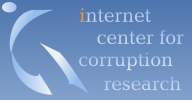| Number |
1 |
2 |
3 |
| Source |
Columbia University (CU) |
Political & Economic Risk Consultancy |
| Name |
State Capacity Survey |
Asian Intelligence Issue |
| Year |
2001 |
2000 |
2001 |
| Who was surveyed? |
US-resident country experts (policy analysts, academics and journalists) |
Expatriate business executives |
| Subject asked |
Severity of corruption within the state |
Extent of corruption in a way that detracts from the business environment
for foreign companies |
How do you rate corruption in terms of its quality or contribution to the overall living/working environment? |
| Number of replies |
251 |
1,027 |
ca. 1,000 |
| Coverage |
121 countries |
14 countries |

|
| Number |
4 |
5 |
6 |
| Source |
Institute for Management Development, IMD, Switzerland |
| Name |
World Competitiveness Yearbook |
| Year |
2000 |
2001 |
2002 |
| Who was surveyed? |
Executives in top and middle management; domestic and international companies |
| Subject asked |
Bribing and corruption exist in the public sphere |
Bribing and corruption exist in the economy |
| Number of replies |
4,160 |
3,678 |
3,532 |
| Coverage |
47 countries |
49 countries |

|
| Number |
7 |
8 |
9 |
| Source |
World Bank |
Pricewaterhouse Coopers |
Economist Intelligence Unit |
| Name |
World Business Environment Survey |
Opacity Index |
Country Risk Service and Country Forecast |
| Year |
2001 |
2001 |
2002 |
| Who was surveyed? |
Senior managers |
CFOs, equity analysts, bankers and PwC staff |
Expert staff assessment (expatriate) |
| Subject asked |
"Frequency of bribing" and "corruption as a constraint to business" |
Frequency of corruption in various contexts (e.g. obtaining import/export permits or subsidies, avoiding taxes) |
Assessment of the pervasiveness of corruption (the misuse of public office for private or political party gain) among public officials (politicians and civil servants) |
| Number of replies |
10,090 |
1,357 |
Not applicable |
| Coverage |
79 countries[1] |
34 countries |
115 countries |

|
| Number |
10 |
11 |
12 |
| Source |
Freedom House |
World Economic Forum |
Gallup International on behalf of Transparency International |
| Name |
Nations in Transit |
Africa Competitiveness Report |
Corruption Survey |
| Year |
2002 |
2000 |
2002 |
| Who was surveyed? |
Assessment by US academic experts and FH staff |
Senior business leaders; domestic and international companies |
Senior businesspeople from 15 emerging market economies |
| Subject asked |
Levels of corruption |
How problematic is corruption? Are irregular, additional payments required? In large amounts? |
How common are bribes to politicians, senior civil servants, and judges and how significant of an obstacle are the costs associated with such payments for doing business? |
| Number of replies |
Not applicable |
1,800 |
835 |
| Coverage |
27 transition economies |
26 countries |
21 countries |

|
| Number |
13 |
14 |
15 |
| Source |
World Economic Forum |
| Name |
Global Competitiveness Report |
| Year |
2000 |
2001 |
2002 |
| Who was surveyed? |
Senior business leaders; domestic and international companies |
| Subject asked |
Undocumented extra payments connected with import and export permits, public utilities and contracts, business licenses, tax payments or loan applications are common/not common. |
Questions (in addition to those mentioned left) refer to payments connected to favorable regulations and judicial decisions |
| Number of replies |
4,022 |
ca. 4,600 |
ca. 4,700 |
| Coverage |
59 countries |
76 countries |
80 countries |
[1] The survey was carried out in 81 countries, but data for two countries was insufficient.

